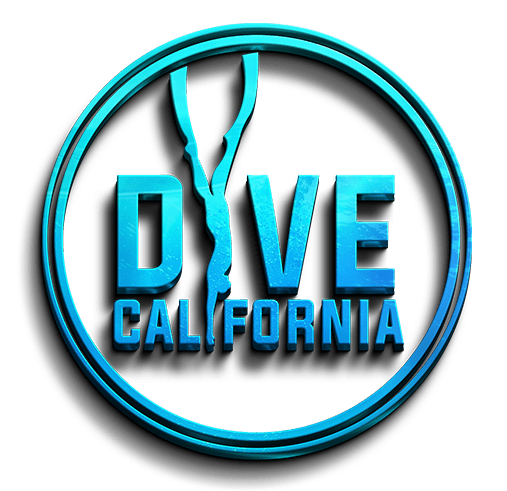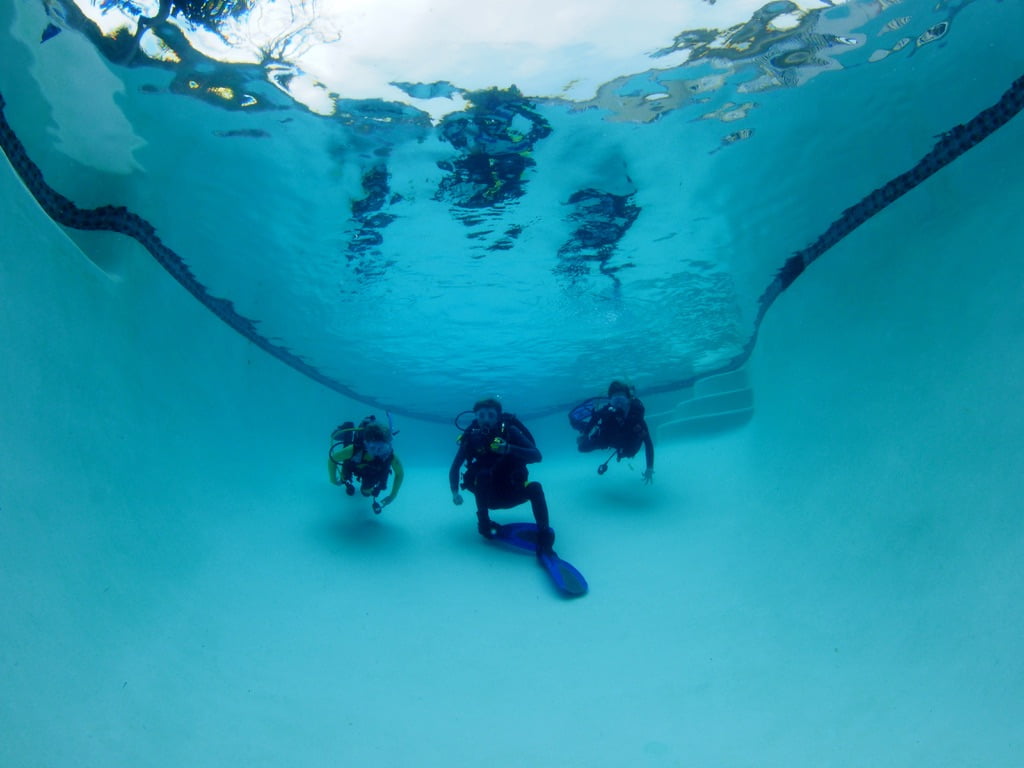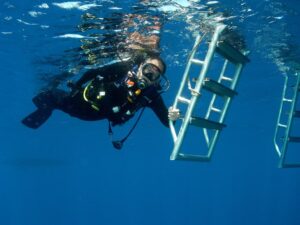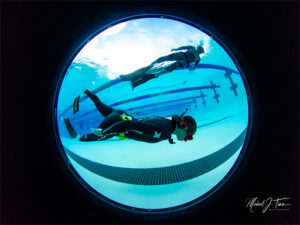Explaining How the Open Water Scuba Course Works
Want to earn your scuba certification? The very first class you’ll take is the Open Water Diver course. This course teaches you the fundamental principles of scuba diving and prepares you to go scuba diving in the ocean, lakes, or rivers.
If you’re thinking about taking the Open Water Diver course, then you most likely haven’t gone scuba diving before and you might have questions or worries about the course experience and your safety.
In this guide, we’ll explain how the Open Water Diver course works, and why it’s a whole lot of fun! We’ll also give you a few helpful tips on how to prepare for the course.
Dive Right In:
- What is the Open Water Diver Course?
- Do I Need a Scuba Diving Certification?
- How the Open Water Diver Course Works
- How Long is the Open Water Course?
- How To Prepare for the Open Water Course
- How To Find the Best Scuba Course
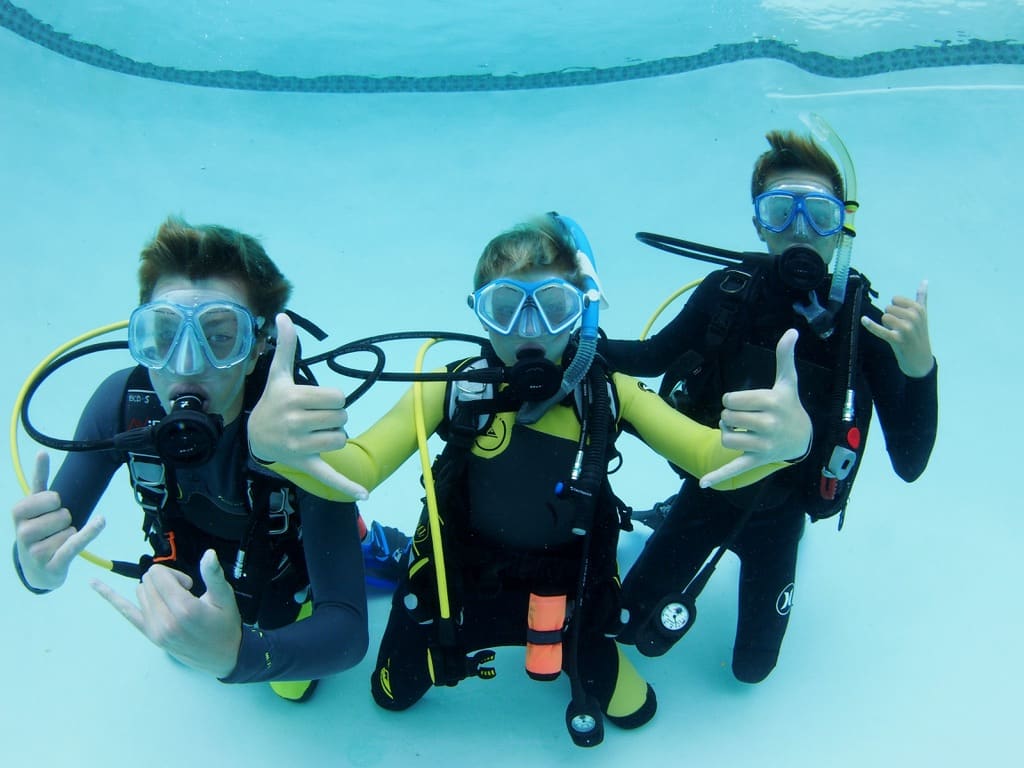
What is the Open Water Diver Course?
The Open Water Diver course is the beginner-level scuba course that teaches you the basic skills and knowledge required to scuba dive.
The course is broken down into three parts:
- Self-Study
- Pool Sessions (Confined Water Dives)
- Open Water Dives
After you complete all three parts of the course, you’ll receive a certification card that will allow you to go scuba diving with dive centers all over the world. Some training agencies will give you a digital certification card.
Do I Need a Scuba Diving Certification?
It’s not illegal to go scuba diving without your certification, but it would be very foolish.
Scuba diving can be hazardous, especially without the proper training. Your Open Water Diver course will teach you how to safely plan your dive, mitigate risk, and deal with unexpected situations that may arise when you’re underwater, like an equipment failure.
No matter where you travel around the world, no reputable dive center will allow you to go diving with them if you haven’t earned your scuba certification. And some dive shops won’t even fill your tanks.
So, your scuba certification is mostly required if you want to go scuba diving, and essential if you want to dive safely.
What are Scuba Training Agencies? (PADI, SSI, SDI/TDI, NAUI…)
When you’re shopping around for Open Water courses, you might see acronyms thrown around like PADI, SSI, SDI/TDI or NAUI. These are scuba training organizations.
Scuba instructors are members of one or more of these organizations. Each organization sets different training standards for their scuba courses. So, depending on which organization your instructor belongs to, your course experience might vary slightly.
But overall, the course standards aren’t very different from one training agency to the next. That’s why you shouldn’t fixate on one agency over another.
When you’re choosing your Open Water course, the most important factor to consider is the individual instructor that will be training you.
A good instructor will make sure that you fully grasp the material you learn in your self-study, and that you feel totally comfortable performing your basic skills in the pool before you head out into open water.
The training agency won’t have much impact on the quality of your Open Water course. But your scuba instructor will.
Pro Tip: If you want the best training experience possible, consider taking a private or semi-private scuba course. These courses have a limited number of students–or no other students at all–so you’ll have more attention and guidance from your instructor.
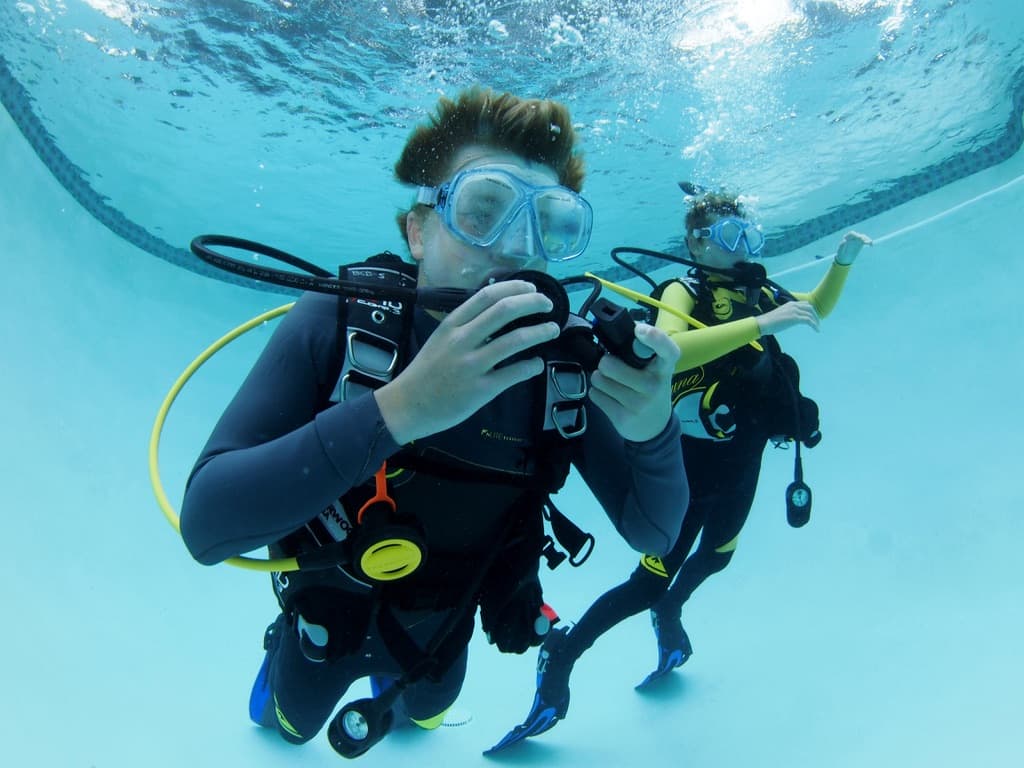
The Open Water Diver Course: Breaking Down All 3 Parts
The Open Water Diver course consists of three segments:
- Independent Self-Study: Before you get wet, you’ll complete course work at home that covers the basic concepts of scuba diving. It’s important that you complete your self-study before you attend the first pool session.
- Pool Sessions: After you’ve completed the self-study, you’ll meet with your instructor and classmates to review some of the concepts that you learned. Then, you’ll start practicing scuba diving in a pool.
- Open Water Dives: Once you feel comfortable diving in a pool, you’ll go and practice your scuba skills in open water.
Medical Readiness
When you sign up for the Open Water course, the dive center / scuba instructor will usually send you a medical questionnaire that evaluates your physical readiness for scuba diving. If you have certain health conditions, you may be required to get a doctor’s approval to participate in the course.
Don’t fret: a health condition may not automatically disqualify you from scuba diving.
Your doctor can help you determine whether it’s possible for you to dive safely with a particular health condition. Furthermore, there are dive centers around the world that specialize in training students who have limited mobility, post-traumatic stress, and other physical or mental ailments.
1. Independent Self-Study
When you begin your Open Water course, you’ll receive course materials that you’ll study before you attend your first pool session.
Most of the training agencies have online learning programs that you can access from your computer or smartphone.
The Self-Study portion will teach you some of the basic theoretical concepts behind scuba diving. You’ll learn:
- How SCUBA gear works
- How the ocean affects your body at depth
- How to safely manage gas absorption
- How to plan a dive
- How to avoid or deal with underwater hazards
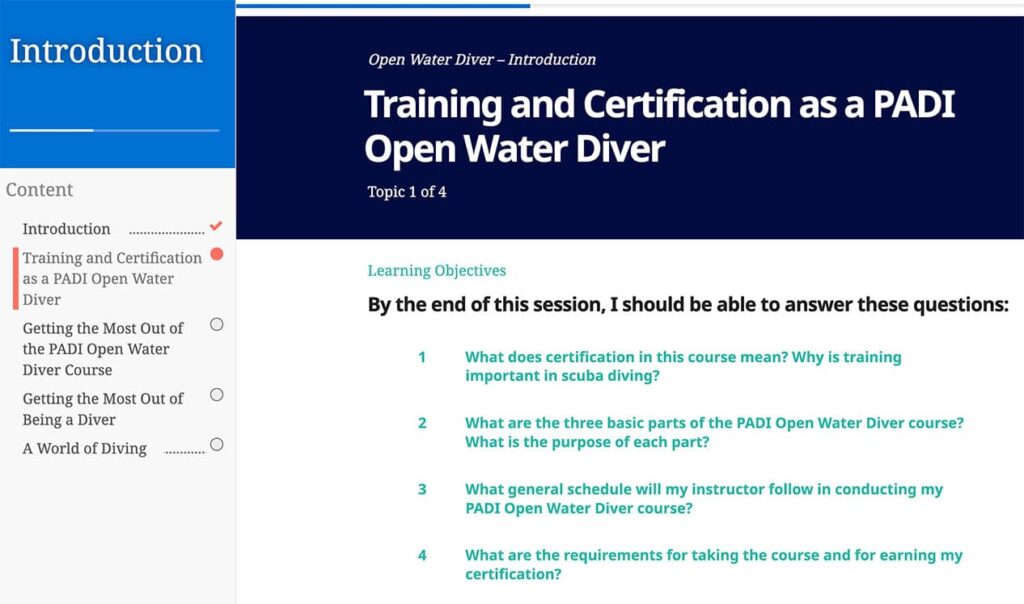
It’s important that you complete the self-study before your first pool session.
Many of the concepts you’ll read about in the self-study portion are critical to your health and safety, so take it seriously.
If you don’t understand some of the concepts, write down your questions and ask your instructor to clarify them during your first pool session.
2. Pool Sessions (Confined Water Training)
On your first day of your Open Water course, your instructor will review the concepts you learned in Self-Study with you and the other students in the class. If you have any questions about the material you learned, your instructor will be happy to dive into them in more detail.
Your instructor will also give you a “quick exam” or “final test” that you must pass with a high enough score to prove that you truly understand the concepts you studied. Usually the test is multiple-choice and no longer than 20 questions.
Don’t fret too much about the test! Remember, by this point in the course, you’ll have completed the Self-Study and reviewed all the core concepts with your instructor. Most of the questions are on “big ideas,” the major scuba diving concepts that are pretty easy to remember. You should only fail the quiz if you didn’t pay attention during the Self-Study.
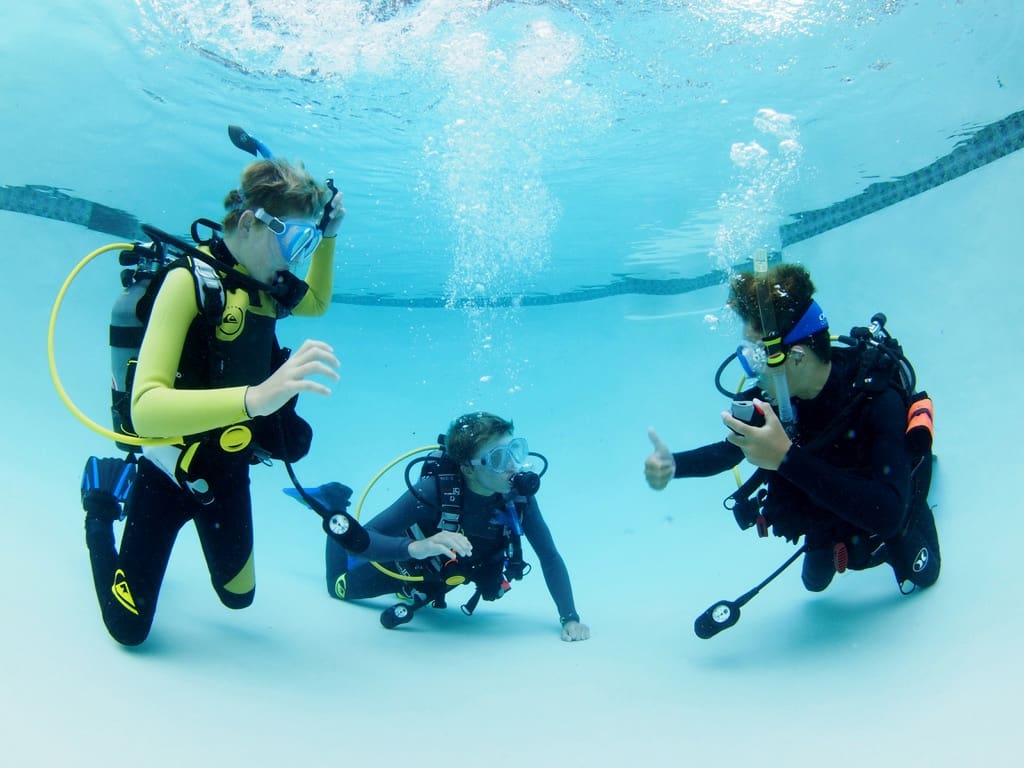
Passed the exam? Now the fun begins! You’ll hop into a pool and start learning how to actually scuba dive.
In most courses, your instructor will teach you how to assemble your gear, and then you’ll practice breathing on scuba. You’ll practice a variety of different scuba skills in the pool, including:
- Proper breathing
- Finding neutral buoyancy
- Using hand signals to communicate
- Different types of finning (kicking)
- Using the inflators and deflators on your BCD
- Equalizing
- Removing your mask, putting it back on, and clearing the water from it
- Removing your regulator (mouthpiece) and using a backup
You must also demonstrate that you’re a capable-enough swimmer to do scuba diving. You must pass a swim assessment that requires you to:
- Tread water for 10 minutes (you can’t touch the sides of the pool)
- Swim 200 yards (there’s no time limit and you may use any swim style)
The length of the pool session can vary. In some courses, this segment is completed on a single day, over 6 to 8 hours. Other dive centers may schedule pool sessions over 3 to 4 days, with each session lasting only a couple hours.
What To Do if You Have a Complicated or Rushed Schedule
If you have a complicated schedule and have difficulty making all the scheduled pook sessions, then consider taking a private course.
In a private course, the instructor will work around your schedule so you can do your training at times that are most convenient for you.
A private course may also be a good idea if you have a rushed schedule (for instance, you’re trying to complete your certification before an upcoming vacation). Usually, you’ll be able to complete a private scuba course at a brisker pace because you’ll be the only student in the class.
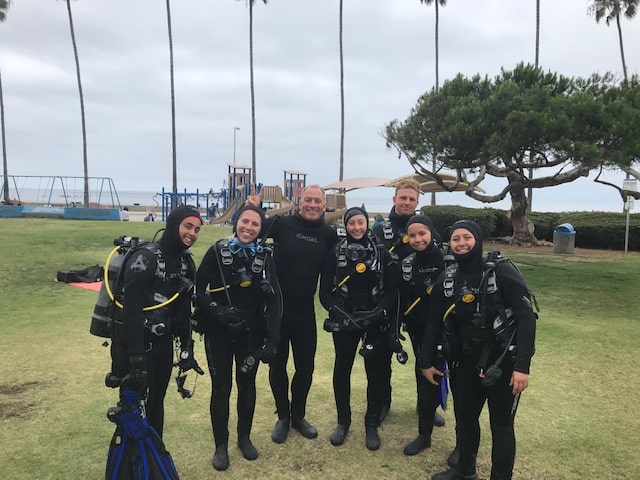
3. Open Water Dives
The open water dives make up the final segment of your Open Water course. Depending on where you’re taking the course, the dives will take place in the ocean, a river, or a lake.
You’ll complete 4 open water dives in which you’ll perform most of the skills that you practiced in the pool. You might also learn a couple new skills, like learning how to enter the ocean through surf, or how to leap off a boat in scuba gear.
The open water dives are memorable because you’ll get to explore a real underwater environment for the first time. For some divers, this will be the first time seeing the ocean from a fish’s point of view. It’s an experience you’ll never forget!
However, these are still training dives and the focus will be on completing your basic skills. On the first dive, your instructor will have you practice the easier skills, and you’ll practice the harder skills by your last dive–by that point, you’ll feel a lot more comfortable in open water.
When you’ve completed the fourth and final dive, you’ll have officially become a certified scuba diver!
How Long is the Open Water Diver Course?
The length of the Open Water course may vary from dive center to dive center.
The course will take at least 3 days to complete: 1 day for the pool session and 2 days for the open water dives.
But you can also find scuba courses that are scheduled over 5 or 6 days, with each classroom session lasting just a couple hours instead of a longer 5 to 8-hour pool session.
Note: The pool session can sometimes be completed in a single day, but the open water dives almost always require 2 days of diving. That’s why the Open Water course generally requires a minimum 3 days of instruction.
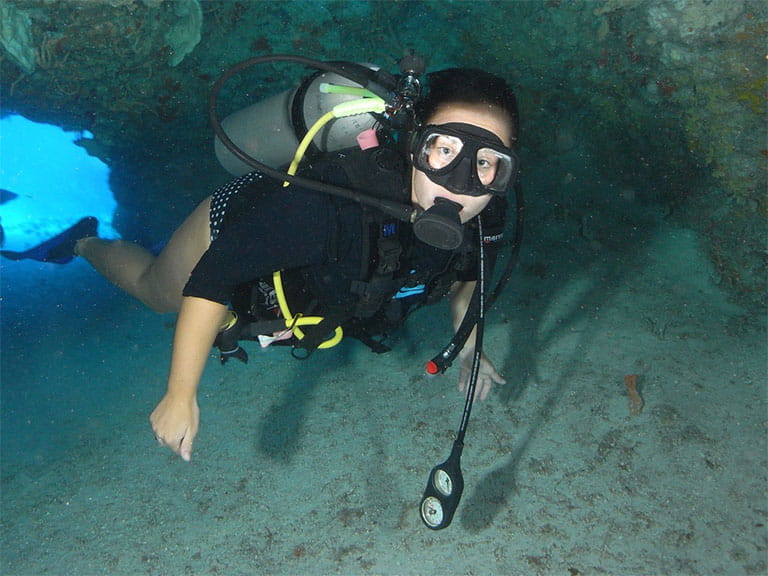
How to Prepare for Your Open Water Diver Course
Feeling nervous about the Open Water course? Not sure whether you’re ready to tackle scuba diving?
There are a few ways you can prepare yourself for the course and boost your confidence!
- Buy Your Own Snorkel Package: Your scuba instructor will most likely provide you with rental gear for the course. But you’ll be more comfortable if you buy your own snorkel package: a mask, snorkel, fins, and boots. Buy these items from your local dive shop, not from a big retailer. A dive shop will have gear that’s built for scuba diving, and they can help you find the right size.
- Buy a Dive Log: A dive log is a booklet in which you log each of your dives. You’ll learn more about dive logs when you take your Open Water course. Since you’ll be doing your first 4 dives on the Open Water course, be sure to have a dive log handy on Day 1. [You can also log your dives on a dive log app. Since many divers forget their logbook at home or misplace it before a dive trip, the app gives you another way to prove your certification to a dive center and log your new dives with photos and GPS coordinates.]
- Go Snorkeling: Nervous about breathing on scuba? Give snorkeling a try. Snorkeling will familiarize you with breathing through your mouth and using a scuba mask.
- Exercise / Eat Healthy: Get a little exercise before your course starts, and do your best to eat healthy foods. Scuba diving can be physically strenuous (scuba gear is heavy!). The healthier you are, the more comfortable you’ll be.
- Speak with Your Doctor: As we mentioned earlier, you should speak with your doctor about your physical readiness for scuba diving. Make sure you have no health conditions that make diving too dangerous or difficult for you. But also remember that it’s possible to dive safely with certain health conditions–speak to your doctor and scuba instructor about them.
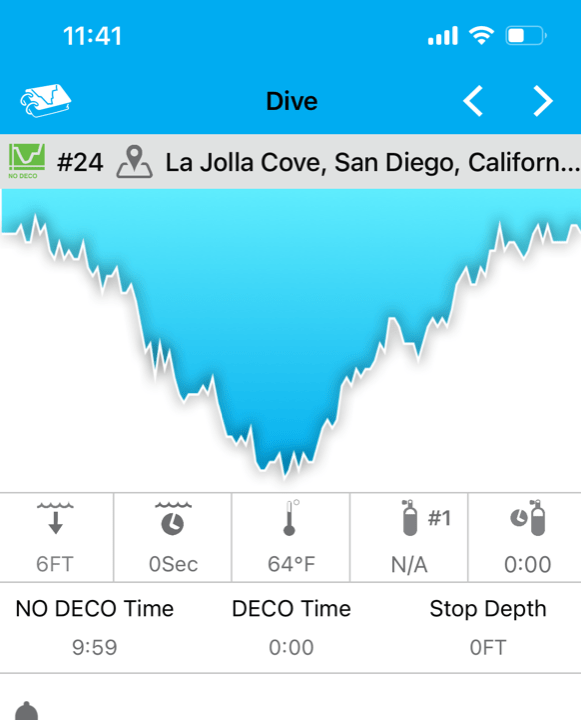
How To Find the Best Scuba Course
There might be several Open Water courses offered in your area. How do you know which one is best?
When you’re shopping around for an Open Water course, keep the following things in mind:
- Length of Pool Session: You don’t want to take a course that rushes you through the pool sessions. Find one that will give you 7 to 8 hours of pool practice. Remember, the more comfortable you are performing your skills in the pool, the more comfortable you’ll be on your open water dives.
- Class Size: Avoid taking classes with more than 4 students (including yourself). The fewer students in your class, the more guidance and attention you’ll receieve from your instructor. Don’t be shy about asking the dive center how large their class sizes are.
- Enthusiasm: Speak with the instructor who will be running your course, or the person who’s doing reservations at the dive center. Do they sound enthusiastic about having you as a student?
Lastly, you should consider whether or not taking a private scuba course would be beneficial for you.
If you’re trying to finish your Open Water course in 3 days, it’s important you take a course that’s private or semi-private (maximum 4 students). Otherwise, you won’t get enough repetitions to gain proficiency in your basic skills. You won’t enjoy scuba diving as much, and you won’t be as safe.
While a private / semi-private scuba course does cost more money, you truly can’t put a price on your safety. And remember that your Open Water certificaiton never expires! A little extra money is absolutely worth it if you want to become the best scuba diver you can be.
Don’t Forget to Have Fun!
Even after you’ve logged hundreds of dives, you’ll always remember your Open Water course and your instructor. Learn as much as you can, ask a lot of questions and don’t forget to have fun!
Just completed your Open Water Course?
Read our blog, You Earned Your Scuba Certification… Now What?
